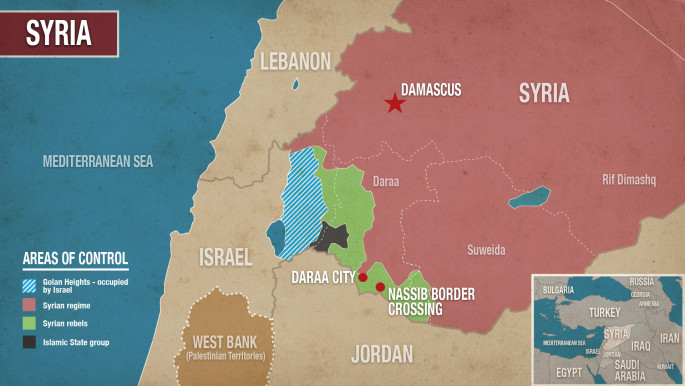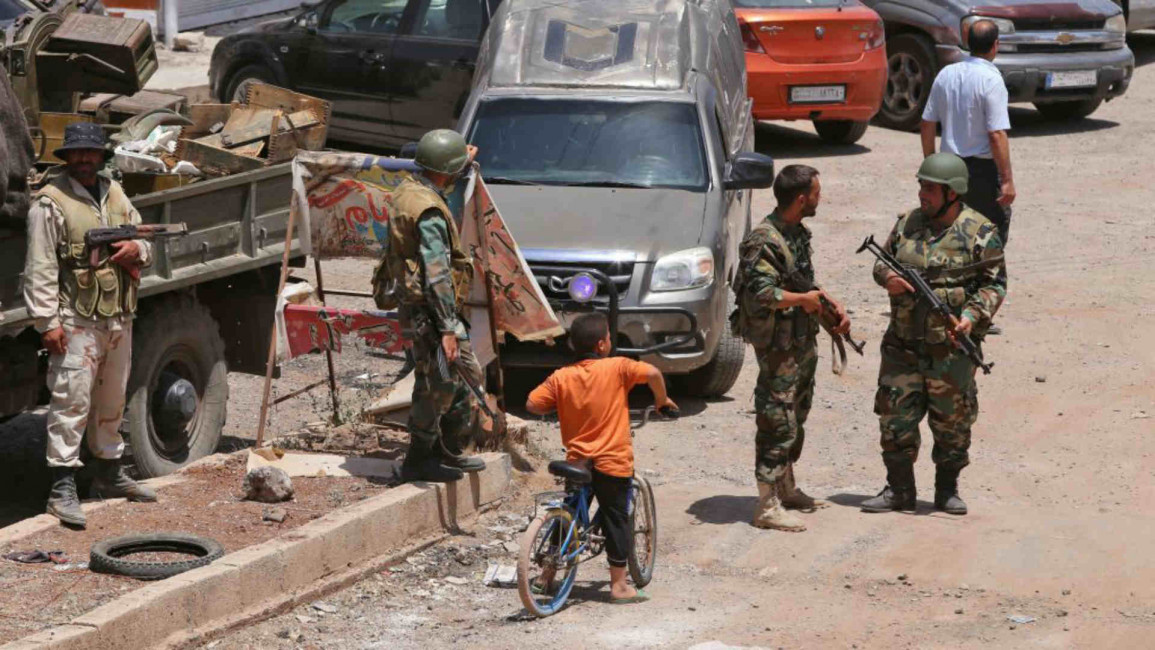
The international community has washed its hands of Syria
In an interview with CBS's Face the Nation, Bolton said that Assad's efforts to crush his opposition were not the Trump administration's principal concern in the region, saying the priority was to get Iran out of Syria.
Bolton's declaration came on the heels of another US statement in late June, telling the heads of Syrian rebel factions they should not expect military support in resisting the Russian-backed government offensive to regain opposition-held parts of south Syria.
In the past week, Syrian regime-allied forces have gained control of the town of Al-Mseifra in Daraa, southern Syria. Last weekend, rebel forces in Busra in the east Daraa countryside handed over their weapons to the Syrian Army, after concluding a reconciliation deal.
In addition, pro-regime website Al-Masdar News reported that in the past week, 27 settlements in the provinces of Quneitra, Suwayda and Daraa had "reconciled" with the regime.
The area is of great importance to President Assad for several reasons. Attacking it does not fit the regime's "war on terror" narrative, while crushing it will mean the end of the mainstream insurgency.
Since July 2017, southern Syria has witnessed relative calm after a ceasefire was brokered by Russia and the United States. The area shares borders with Lebanon, Jordan and Israel and is dominated by the mainstream Free Syrian Army factions regrouped under the banner of the Southern Front.
 |
Attacking Daraa does not fit the regime's 'war on terror' narrative |  |
This force is comprised of 20,000 fighters spread across the southern provinces. The presence of jihadi groups is limited to a small number of Islamic State fighters affiliated with the Khalid bin Walid Army, located mostly in the Yarmouk Basin.
From a military opposition standpoint, the southern region factions have historically fallen under the control of the Jordanian Military Operations Command (MOC) established in 2013 by the United States, and which was in charge of financial and military support to the rebels.
Second, the region holds strategic importance for military and economic reasons.
Retaking the Nassib border crossing with Jordan would allow Assad to reestablish profitable trade routes, and its proximity to Israel makes it a key military location.
Last month, Israel had asked Russia for a withdrawal of Iranian forces, and a deal was reached allowing a withdrawal of these forces 40km away from the Golan.
 |
|
Much had been made of a regime-dominated operation, led by the Tiger Forces and the 4th Division, however, in the past week, the pro-Iran Liwaa al-Baqir confirmed the presence of some of its members in Daraa. In addition, news websites reported the deployment of two other pro-Iran groups - namely Abu Fadl Abbas, and Liwaa Zulfiqar.
Despite the presence of these Iran-allied forces in the region, and the large wave of refugees the onslaught triggered - estimated by the UN at more than 270,000 - Syria's immediate neighbours, Israel, Jordan and the international community, have sat idle, appearing to wait for a swift resolution of the conflict in favour of Assad.
 |
The international community, have sat idle, appearing to wait for a swift resolution of the conflict in favour of Assad |  |
Jordan closed its borders to refugees and stemmed its support to rebels, focusing instead on trying to broker a deal between the FSA and the Syrian government's main ally, Russia. The talks broke down during the weekend, as the army seized more ground in its offensive. In recent months, Jordan has clearly softened its stance against Assad.
The Middle East Institute has reported that last April, Atef al-Tarawneh, the speaker of the lower house of the Jordanian parliament, admitted Jordan was engaged in security coordination along their common borders and that Jordan supported efforts to allow the Syrian regime to take back its seat in the Arab League.
Twitter Post
|
Israel also appears to favour Assad remaining in power, believing that a rebel takeover of Syria could lead to more chaos on its borders and that Russia's presence in Syria could help contain Iran, according to an interesting analysis piece, Syria's Assad has become Israel's ally, by Zvei Barei published in Haaretz this week.
In 2013, at the height of the Syrian revolution, former Israeli military chief Dan Halutz declared Israel would prefer Assad held onto the presidency in Syria, rather than leave a power vacuum that could be filled by Islamist radicals.
Jordan and Israel's position appear to fall along the US lines. Bolton's statement clearly broke with Washington's previous rhetoric of "Assad must go" when he declared that Syria was one area in which Russia and the US could make progress.
The battle for south Syria puts the final nail in the coffin of the Syrian insurgency. The international community appears to have bowed to Russia: They say Assad must stay.
Mona Alami is a French-Lebanese analyst who writes about political and economic issues in the Arab world. She is a nonresident fellow at the Atlantic Council's Rafik Hariri Center, and the King Faisal Center for Research and Islamic Studies.
Follow her on Twitter: @monaalami
Opinions expressed in this article remain those of the author and do not necessarily represent those of The New Arab, its editorial board or staff.




